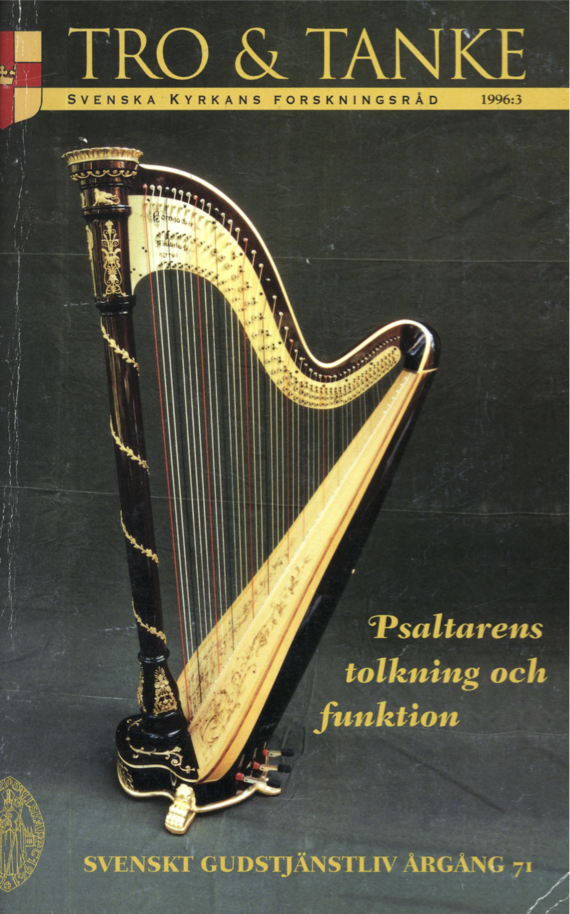Kristus i Psaltaren
Abstract
Christ in the Psalms — an anachronism? Surely the Book of Psalms arose in old Israel long before Christ was born! Still, even according to Jewish conviction, the Psalms give prophetical witness of the future Messiah, liberator and prince of peace descended from king David. According to Christian conviction, Jesus is Messiah; the Psalms are therefore read as dealing with him. However, Jesus is not identified with Messiah only. Since he is confessed to be true God and true man, he may be identified both with the Lord God or the Son of man mentioned in the Psalms and with the suffering servant of God. Such identifications seem to he based on Christ’s own self-assurance. As shown in the Psalms quotations which he uses on the cross, he was also able to identify himself with the very self of some particular psalm, the ”1” speaking in it. The Christian interpretation presupposes also that Christ is the one who primarily speaks and prays through the Psalms; the congregation or the individual believer prays the Psalms in communion with him.
The most important of the messianic, or originally royal, psalms is 110, used in Jesus’ catch question to the Pharisees in Matth. 22,41ff.: The Lord said to my Lord, ’Sit at my right hand until I put your enemies under your feet’. All seem to agree that God is here speaking to Messiah. The psalm is quoted in many places in the New Testament, e.g. in 1 Cor. 15 where Paul treats the resurrection of the dead. He presupposes that it deals with Christ’s heavenly enthronement after his resurrection and with the continuous battle against the spiritual powers of evil (the ”enemies”) until his second coming when God will he all in all. The psalm also speaks about the king as priest, v 4. This is thoroughly commented in Hebr., ch. 4-10. Christ is the priest offering himself on the Cross but also perpetually interceding for his people before God. The latter motif is essential for the liturgical use of the Psalms in the office of the hours, where psalm 110 has its traditionally prominent place as the first psalm of the Sunday vespers. Other important messianic psalms are 2, 45, 72 and 118.
In the N.T., Christ, especially after the resurrection, is entitled The Lord which implies a divine standing; according to Phil 2:9-10, God ... bestowed on him the name above all names, i. e. G od’s own name. Any psalm directed to God the Lord (and there are plenty of them) may thus he interpreted as directed to Christ; and for psalms like 24, 96 or 98 such an interpretation has always stood out as particularly appropriate.
According to Matth. 27:46, Jesus on the Cross cried the Hebrew words of Psalm 22:1, My God, my God, why hast thou forsaken me? This psalm is about the suffering servant of the Lord. Further verses reflected in the Story of the Passion are 7-9 in Matth. 27:31, 41-44, and 19 in Matth. 27:35. Other psalms of a similar kind are 69 (v 10 is quoted in John 2:17) and 88. Psalm 40:6ff is given a christological interpretation in Hebr. 10:5. Psalm
116 is, above all, a thanksgiving for the rescue from suffering and mortal danger.
Psalms about the greatness of man are supposed to give evidence about Christ, the true man. The one most frequently quoted is psalm 8, whose v 7 is rather unexpectedly said to witness of his resurrection and is associated with Psalm 110:1, in 1 Cor. 15:27, Hebr. 2:5-9 and others. Psalm 16 is given a similar interpretation in Acts 2:14ff. Psalm 91, traditionally used in Sunday compline, is quoted in Christ’s controversy with the devil, Matth. 4. Psalm 31:6 is quoted by the dying Jesus according to Luk. 23:46; it is used daily as response text in the compline.
Psalms in w hich ”1” declare my innocence and justice (e.g. Psalm 26) are interpreted tropologically according to a hermeneutical tradition origina ting from the early Church. This means that Christ is here understood to speak through the psalm; we are innocent and just only while participa ting in his innocence and justice. Psalms including confession of sins (e.g. 32, 51, 130) are given a similar interpretation: Christ is the one who carries the sin of the world and intercedes for us before God the Father.
Downloads
Publicerad
Nummer
Sektion
Licens
© författarna, Laurentius Petri Sällskapet för svenskt gudstjänstliv samt Artos & Norma bokförlag. Det är tillåtet att kopiera och använda material ur Svenskt Gudstjänstliv för forskningsändamål om källan anges. För övriga ändamål kontakta respektive artikelförfattare samt förlaget. Särskilda restriktioner kan gälla för bildmaterial.


